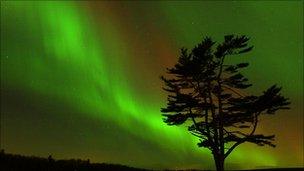Aurora Borealis to light up the night sky
- Published

Scientists said the burst of radiation and magnetic energy could also disrupt communications
The possibility of seeing the Northern Lights in Scotland on Thursday and Friday night has increased after the sun unleashed a giant solar flare.
Scientists said the burst of radiation and magnetic energy could also disrupt communications equipment.
The phenomenon is caused by charged gas particles that flow away from the Sun as a "solar wind" interacting with the Earth's magnetic field.
The particles "excite" gases in the atmosphere and then make them glow.
The colours depend on the type of gas - a red or green glow is oxygen and the blue and purple colours are produced by nitrogen.
Dr Martin Hendry, senior lecturer in astronomy at Glasgow University, told BBC Radio's Good Morning Scotland programme: "Sometimes the aurora can be a little bit indistinct but on other occasions it can be a very vivid colour.
"In fact the different colours reflect the different chemical elements in our atmosphere being affected and they then interact with the discharge from the sun.
He added: "So if it is a bright one, and the evidence suggests that this might be, it is a large solar flare. It really should be unmistakeable."
- Published5 February 2011